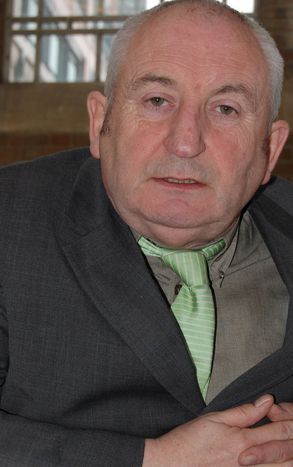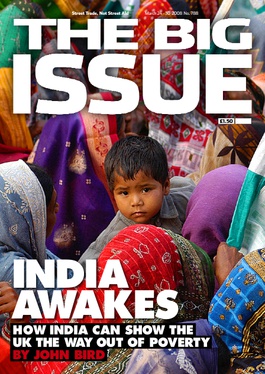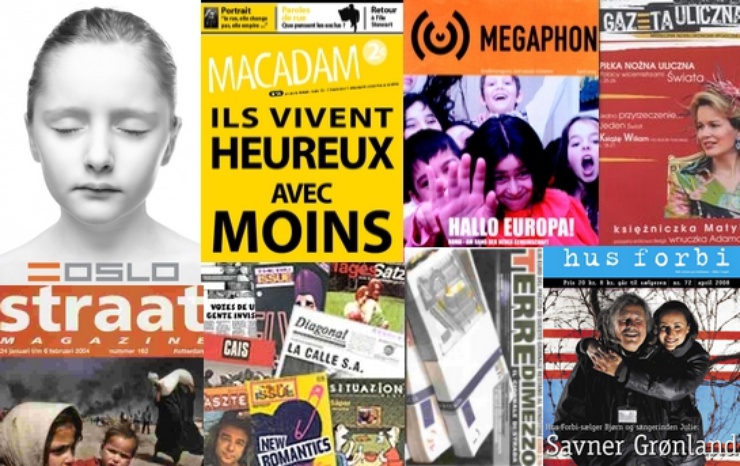
John Bird: ‘I know what it's like to be prejudiced, drunk, imprisoned’
Published on
As ‘The Big Issue’ street magazine for the homeless turns seventeen this September, its co-founder and social entrepreneur, 62, on racist London-Irish upbringings, crime, Paris 1968 and poverty in Britain
 ‘I don’t like most journalists,’ grumbles John Bird. He has just rounded up an editorial meeting at Ponti’s café, above platform seventeen in London’s Liverpool Street station. ‘They don’t think analytically. I don’t wanna hear how many block people died. No more stories about what an arsehole George Bush is. We need people looking for problems and solutions, not just exposing it and moving on. Investigative journalists like John Pilger from the Daily Mirror - I told him – are not socially located, but above everybody.’
‘I don’t like most journalists,’ grumbles John Bird. He has just rounded up an editorial meeting at Ponti’s café, above platform seventeen in London’s Liverpool Street station. ‘They don’t think analytically. I don’t wanna hear how many block people died. No more stories about what an arsehole George Bush is. We need people looking for problems and solutions, not just exposing it and moving on. Investigative journalists like John Pilger from the Daily Mirror - I told him – are not socially located, but above everybody.’
Paris je t’aime
Meet the founder of The Big Issue (TBI), an entertainment and current affairs street weekly which is also a ‘social business’. Written by professionals, it is distributed in five regional editions by the homeless. Badged vendors buy the magazine from The Big Issue Foundation (which funds programmes for the homeless) for 70p (90 cents) and sell them on the streets for £1.50 (2 euros), thus making a profit of 80p (1 euro) per copy. ‘I’m not a particularly good editor,’ Bird admits over a second ‘bucket of tea’, as the city suits criss-cross and trains rumble in the station below. He left the post in 2006. ‘Writing is a good way of sharpening up your ideas and that shit. If you’re a very good conductor you might not be good on the violin. But I’d rather play it.’

You could say that the violins played for Bird once you hear of the racism, poverty and literal being on the fiddle that inspired his writing. John Bird knows homeless. Rewind forty-one years, selling the International Herald Tribune for a few months on the streets of the Champs Elysee, his first time abroad. He hid from the police after getting a one-year passport from the post office. At the time, he lived on the same street as I do now in Paris - ‘I swear on my life’ - with a colleague, Leanelle-the-one-legged-Goan-from-India, ‘who was your kind of colour,’ Bird remarks.
‘Most people with a political bone in their bodies are mouthing the shit that comes from somewhere else'
Is it a strange comment coming from someone who was has described himself then as being a ‘white working-class racist’? ‘Most people with a political bone in their bodies are mouthing the shit that comes from somewhere else,’ he replies. Bird’s Irish catholic mother moved from Cork to London at eighteen, working in a pub before she met her protestant husband. ‘She was telling me from an early age it was Indians-Jews-money-blacks-lazys who were destroying the country. I started life being poisoned by the mind-forged manacles of poverty that it’s someone else’s fault. You have to find Arabs or French people to pick on.’
Big issue Europe
From xenophobe to soixante-huitist (Bird took part in the 1968 riots as part of the JCR or jeunes communiste revolutionnaire, the trotskyist league run by Alain Krivine), to printer, by the age of 29 Bird had published his own art magazine. In 1991, it was British entrepreneur Gordon Roddick, husband of Anita, the founder of The Body Shop, who invited him to run The Big Issue. Roddick was inspired by the world’s first magazine for the homeless, New York’s Street News, which had already been running for three years. From earning one million a year in 2003, The Big Issue became more advertiser-friendly, eventually turning over four million in 2007.
TBI sponsored the International Network of Street Papers (INSP) in 1995. £30, 000 later, sixty national spin-offs in twenty European countries included Spain’s ill-fated La Farola and Belgium and France’s equally short-lived Macadam Journal, founded by a French homeless vendor and Belgian businessman respectively. ‘It got taken over by some right-wingers,’ Bird says of Macadam. ‘We just gave the French and German papers a style. There are real problems in Europe,’ he says, referring to the fact the paper kept its name in places like Australia and Namibia. ‘A lot has to do with competitiveness - you can never get anyone working with others, look at Germany which has thirty street papers for each different town. They think they’re unique.’

In Britain, poverty is government sponsored, according to Bird. ‘Virtually all the young black kids going around killing each other come from a social security background. They are kept in poverty by the state’s benefit bureaucracy. It doesn’t manufacture hope, justice or opportunities. It screws up education.’ The word ‘posh’ keeps popping up. ‘Posh means disconnected,’ he explains. ‘Having a culture which doesn’t adjust to reality. The virgin government spoke to the ‘experts’ - the homeless, poverty organisations - but they left thousands of lives fractured.’
‘You’d look after a home better after being homeless’
 Bird says young offenders know he is sincere. ‘There are only a handful of people like me in Britain. Apart from the fact that I come from poverty, I’ve done every conceivable thing wrong in this life and survived. I know what it is to be like prejudiced, drunk, imprisoned, trying to kill people with guns. I had a future, not like my elder brothers, who are either dead through drink and drugs or living in high rise hells on the edge of town, hating blacks, Jews, Indians. Fucking scumbags. I’ve got nieces and nephews who I’d speak to in a foreign accent so they wouldn’t know who I was if they rang me up.’
Bird says young offenders know he is sincere. ‘There are only a handful of people like me in Britain. Apart from the fact that I come from poverty, I’ve done every conceivable thing wrong in this life and survived. I know what it is to be like prejudiced, drunk, imprisoned, trying to kill people with guns. I had a future, not like my elder brothers, who are either dead through drink and drugs or living in high rise hells on the edge of town, hating blacks, Jews, Indians. Fucking scumbags. I’ve got nieces and nephews who I’d speak to in a foreign accent so they wouldn’t know who I was if they rang me up.’
Learning to read and write aged sixteen in prison was the ‘biggest social mobility’ Bird says he got, something that no-one buys into today. ‘Learning late makes it more apparent in your life, like the power to not be a racist.’ He certainly turned things around in both respects. After an independent bid to be London mayor in spring 2008, he is now writing a book about the west London district Notting Hill, a birthplace he recalls of ‘abject poverty and shit right-wing fascist thinking’. His wife has Indian origins, and his two little children aged three and seventeen months have Sikh names. ‘I’ve learnt to become a part of the solution, not the problem. My kids are the result of the solution.’



